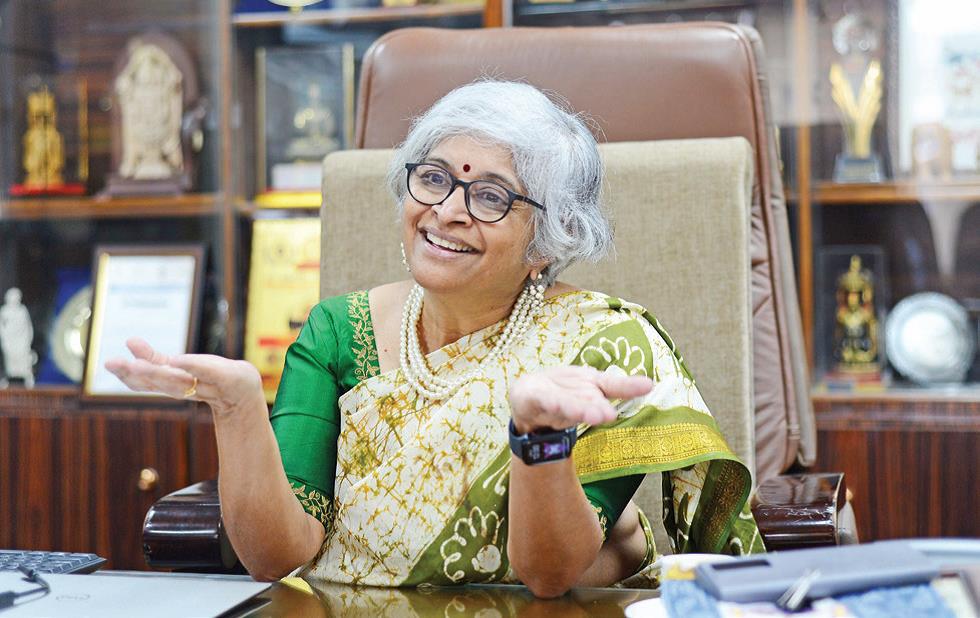
Breaking barriers in mental health: Dr Pratima Murthy gives insights
Bengaluru, NT Bureau: Dr. Pratima Murthy, Professor and Head of Psychiatry at NIMHANS, became the full-term Director on June 18, 2021.
With 30 years of experience, she is a leading figure in addiction psychiatry, having developed NIMHANS' Centre for Addiction Medicine. She has consulted for UNODC, ILO, and WHO, and contributed to mental health care quality with the National Human Rights Commission.
Her numerous accolades include the Dr. Raja Ramanna State Award and the WHO Regional Director’s Special Recognition Award. In a conversation with News Trail, Dr Pratima shared her expert insights on the recent developments, treatment approaches, and the broader societal impact of mental health issues.
Q. Can you tell us about the changes in people's attitudes towards mental health?
Ans. One significant change is the increasing acceptance of mental health issues. Traditionally, there has been a lot of stigma around those seeking help for mental health.
Nowadays, people are more open to acknowledging their mental health problems. Just as you would discuss a headache or chest pain, you can now talk about feeling depressed or anxious without being judged.
It’s crucial for people, especially those experiencing severe distress or suicidal thoughts, to communicate these feelings. Such states are often temporary, and with the right help, they can be overcome. Understanding that every life is precious is essential for equitable mental health and social care.
Q. How has technology impacted mental health care, especially during Covid-19?
Ans. The pandemic significantly transformed mental health care through telemental health and digital platforms. Online counselling and mental well-being apps have become more prevalent.
There is now a focus on mental well-being, not just treating illnesses. Self-help is also emphasised, allowing individuals to manage their mental health. Newer psychiatric medications with fewer side effects and innovative treatments like neuromodulation show promise.
Artificial intelligence is being explored to detect early distress and enhance preventive measures. Both research and promising treatments are evolving in these areas.
Q. What role do psychological interventions and traditional practices play in mental health promotion?
Ans. Psychological interventions like cognitive behaviour therapy and mindfulness are vital. Additionally, traditional practices such as yoga are gaining recognition for their mental health benefits. It's important to consider all aspects of health – physical, mental, spiritual, and social wellbeing.
The pandemic heightened awareness on psychological distress and the need for accessible help. It also revealed digital inequalities, where some could access online resources while others couldn't. Addressing these disparities is crucial.
Q. How do you address addiction and its changing patterns?
Ans. Addiction is now recognised as a brain disorder, similar to other medical conditions. It affects the brain’s reward circuit, leading to cravings and withdrawal symptoms.
Addiction patterns can change based on substance availability. Besides chemical addiction, behavioural addictions like gambling, pornography, and mobile addiction also affect similar brain pathways. It’s important to avoid risky behaviour and adopt healthy lifestyles, including exercise and routines.
While 'healthy addiction' is a term used loosely, a balanced approach with good life skills, diet, sleep, and relationships is key to a healthy lifestyle.
Q. What are the biggest challenges in accessing quality addiction care in India?
Ans. Awareness about addiction and recognising risky substance use is the first challenge. The traffic model – green, amber, and red zones – helps understand this. Staying in the green zone involves avoiding substance use and maintaining healthy habits.
The amber zone indicates occasional use becoming problematic, while the red zone is harmful or dependent use. Self-administered scales can help identify harmful drinking limits. People with a family history of addiction must be cautious as addiction is genetically influenced.
Q. Can people from addicted families overcome their addiction?
Ans. The brain can change and adapt over time. Giving up substances is easier than staying drug-free because the brain needs several months to readapt. These changes include epigenetic alterations that take time to reverse.
Addiction traits can be transmitted intergenerationally, but with time and effort, individuals can overcome addiction. Often, addiction is accompanied by other mental or physical comorbidities, making comprehensive care essential.
Q. How do you approach treatment for addiction at NIMHANS?
Ans. Our treatment involves addressing cravings, stabilising moods, normalising biological functions like sleep and appetite, repairing relationships, and preventing relapses. This is done through individual and family counselling.
The period after three to six months of stopping substance use is crucial, as it's the highest risk for relapse. Addiction is a chronic, relapsing condition, much like heart disease or diabetes. It's not just about acute treatment; the brain undergoes long-term changes that take time to reverse.
Lifestyle changes, stress management, and relapse prevention are essential, similar to managing chronic illnesses like diabetes.
Q. How can families support an individual going through addiction treatment?
Ans. Families need to understand addiction as a disorder. Blame and over-involvement are counterproductive. Families should provide support, seek accurate information, and avoid behaviours that increase stress or suspicion. Their role is critical in preventing relapse and aiding recovery.
Q. With the increase in mental health awareness, why are stress, anxiety, and suicide rates still rising?
Ans. Society needs to value human life and understand that suicide is not a solution. Education institutions should offer confidential counselling.
Providing adequate services, psychological first aid and community support can help people through tough times. Schools should teach life skills, empathy, communication, problem-solving, and healthy coping mechanisms.
Recognising and nurturing individual strengths and addressing specific needs, such as for hyperactive or anxious children, is essential. This approach fosters resilience and mental wellbeing among students.
 English daily published in Bengaluru & Doha
English daily published in Bengaluru & Doha






